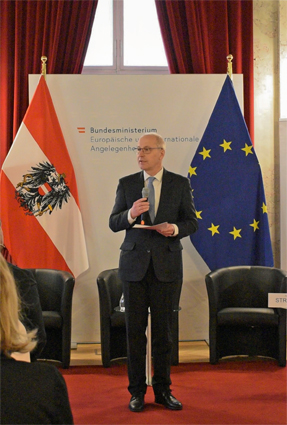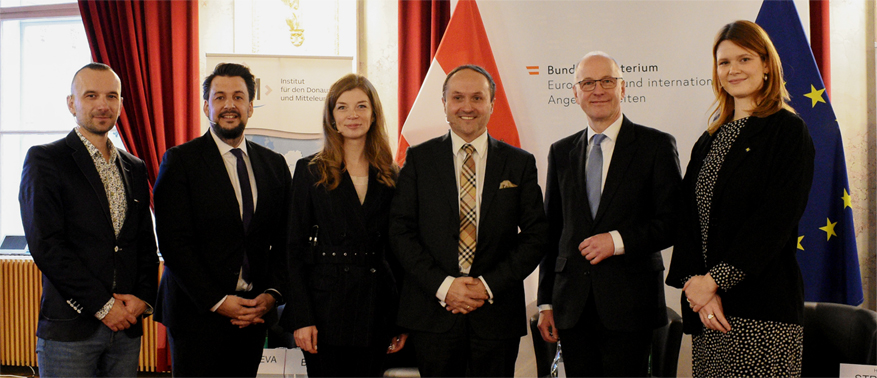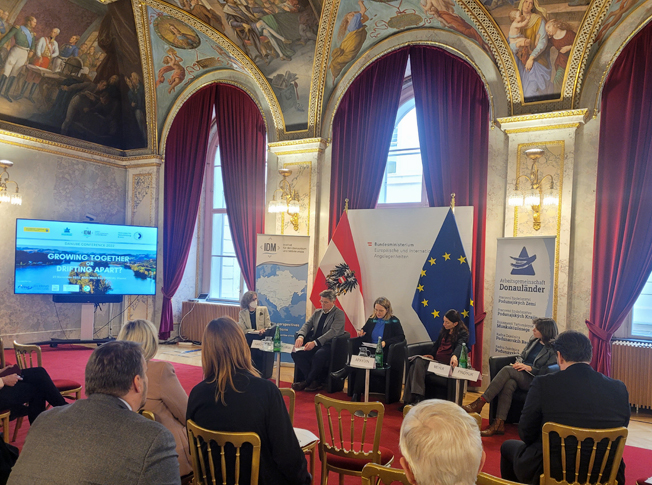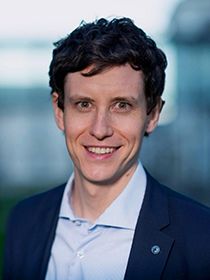What about the responsiveness of macro-regional strategies such as the EU Strategy for the Danube Region (EUSDR) in times of crisis? How do the Danube countries react to the dangers and consequences of the Russian war of aggression against Ukraine? And how can cross-border cooperation on issues of climate protection and energy transition succeed? The eleventh edition of the danube conference gathered representatives from politics, administration, science and culture at the invitation of the Institute for the Danube Region and Central Europe (IDM) and the University for Continuing Education Krems to debate the power and powerlessness of regions.
The Danube connects, but it can also divide. The more crisis-ridden the present, the more the neighbors along the international river threaten to drift apart. This makes cross-border cooperation and open discussions between the various actors all the more important. This observation was shared by the international speakers of the Danube Conference 2022, which was organized by IDM and the University for Continuing Education Krems under the auspices of the Working Community of the Danube Regions (ARGE Donauländer), with the kind support of the Federal State of Lower Austria and in cooperation with the Federal Ministry for European and International Affairs, Austria (BMEIA) and other partner institutions (University of Natural Resources and Life Sciences Vienna, IMC University of Applied Sciences Krems and the Europa-Forum Wachau).
This year's conference entitled "Growing together or drifting apart?" was opened by Ambassador Harald Stranzl of the BMEIA, representing Section Head Thomas Oberreiter. He stressed the importance of macro-level cooperation in the Danube Region in a new geopolitical situation, and events such as the Danube Conference, which make visible the changes and challenges in the Danube Region and invite to enter into an exchange on relevant issues. In his video message, State Minister of Housing, Labour and International Relations in the Government of Lower Austria Martin Eichtinger emphasized the key role of cooperation between the countries along the Danube for peace in Europe. Friedrich Faulhammer, who welcomed the guests in his double function as the new IDM Chairman and Rector of the University for Continuing Education Krems, also emphasized that there is a great deal of European potential in this diverse region, which is shaped by the Danube and its tributaries and combines different religions, historical experiences, ethnic groups and traditions.
Regional cooperation against war
The Danube Conference 2022 focused on the manifold consequences of the Ukraine war for the entire Danube region. With the political scientist Nadija Afanasieva, Director of the Ukrainian Institute for International Politics (UIIP) in Kyiv, and Olga Pindyuk, economist at the Vienna Institute for International Economic Studies (WIIW), two proven Ukraine experts shared their assessment of the political and economic consequences of the war. On further rapprochement toward Ukraine's EU accession, Afanasieva said, "Finally, everyone in the region has understood that we have to work together on this. If we continue to drift apart, Ukraine will disappear from the map and other countries will follow." In the first panel, moderated by IDM Managing Director Sebastian Schäffer, Afanasieva was joined by the two National Coordinators of the EUSDR, Michal Blaško for Slovakia and Harald Stranzl for Austria, who debated the potentials and limitations of medium- to long-term strategies like the EUSDR when it comes to responding to events that require short-term action. Slovenia currently holds the presidency, which will be taken over by Austria in November 2023. Teresa Stummer, in her function as representative of the Working Community of the Danube Regions (ARGE Donauländer), emphasized the possibilities of cultural diplomacy, which often serves as a door opener for further projects of cross-border cooperation. In this sense, the artistic performance of two young dancers, who presented pieces of the Moldovan choreographer Mihail Sosnovschi, was a diversified addition to the discussions at the podium.
Cross-sector discussions necessary
The second panel, moderated by IDM researcher Daniela Apaydin, focused on the unifying element of the Danube, with experts from different sectors discussing pressing issues of energy, ecology, democracy and economics. How can Europe become independent from Russian gas and at the same time prevent climate-damaging actions? What is the future of hydropower, given the unrepaired damage of past infrastructure projects? And how can regional actors have a say and bring about change, even in complex crisis situations? Olga Pindyuk, environmental historian Gertrud Haidvogl (BOKU), Artur Lorkowski, director of the Energy Community, and democracy and regional researcher Sarah Meyer (University for Continuing Education Krems) debated these questions. Meyer, on the role of sub-national actors in the multi-level system of the EU, pointed out that the Danube region not only has a strong diversity of interests and opinions, but that regions also have different degrees of autonomy and room for maneuver. Lorkowski provided insights into the integration of the European energy market and challenges of the energy transition. Haidvogl, who called for more cooperation between disciplines and between science and society, shared her assessments of ecological threats in the Danube basin and pointed out that countries bordering the Danube in particular must assume mutual responsibility. Pindyuk gave an insight into Ukraine's economic challenges. In her view, "Ukraine has the potential to become one of the most important energy exporters in Europe."
Contact
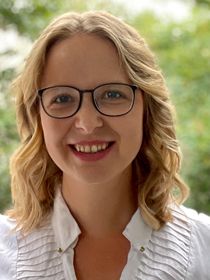
Dr. Daniela Apaydin
Institute for the Danube Region and Central Europe – IDM, Hahngasse 6/1/24, 1090 Wien
Tags
